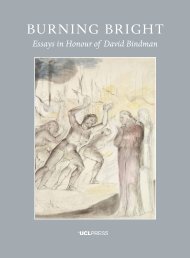Archives
TiL0x
TiL0x
You also want an ePaper? Increase the reach of your titles
YUMPU automatically turns print PDFs into web optimized ePapers that Google loves.
with her ‘snow-white throat’ and ‘divine voice’ (as he later recalled<br />
them). At the time at which he first knew her, Lady Killigrew was<br />
referred to in London as ‘the young, French’ Lady Killigrew (implying a<br />
certain moral laxity, one gathers). She appears to have been pregnant<br />
for most of Huygens’s time in London (her last two children were born<br />
in 1622 and 1623), so I am not suggesting that this was more than a<br />
flirtation. On the other hand, the decorum of their relationship was<br />
surely questionable. Even late in life, Huygens would remember his<br />
hostess with particular passionate fervour. Tellingly, that same autobiographical<br />
poem which refers to Lady Killigrew’s physical attractiveness<br />
and musical brilliance contains no mention of Dorothea whatsoever. 21<br />
In March 1623, Dorothea wrote two letters in English to Lady<br />
Killigrew – or at least, that is when the letters were drafted, according<br />
to the dates at the bottom of the manuscripts preserved among the KB<br />
Huygens letters. To be more precise: at the bottom of the first letter has<br />
been written ‘Hague, this [blank] of March 1623’, indicating that the<br />
date is to be filled in later; the second letter carries no date, but at the<br />
top, in a later hand, is written ‘1623 perhaps’ (‘for[si]tan’). Both letters<br />
carry the superscription, ‘For m[adam]e dor[othea] van dorp for the<br />
Lady Killigrew’.<br />
The first letter is a kind of self-introduction, offering a small<br />
gift and dedicated service to Mary Killigrew, based on Constantijn<br />
Huygens’s glowing recommendation of her virtues. It might be intended<br />
to commence a negotiation concerning some kind of position for<br />
Dorothea in the Killigrew household (elsewhere in her letters Dorothea<br />
makes it clear that she is working hard on her English: ‘you know why’,<br />
she says to Constantijn):<br />
Madame: The testimonies my friend S[ir] Constantin Huygens<br />
hath giuen me heretofore by his letters of y[our] Lad[yships]<br />
most rare and singular qualities, are so great and so manie, that<br />
even afore I saw him I found myselfe short of wordes in mine<br />
owne language, by w[hich] I could haue giuen y[our] Lad[yship]<br />
the thankes I owed y[ou] for esteeming me worth the offring of<br />
y[our] special loue and friendshippe; the remembrance of w[hich]<br />
21 ‘. . . solam, / Killigraea domus, si te cito, dixero multas. / . . . Tota domus concentus erat:<br />
pulcherrima mater, / Mater (adhuc stupeo) duodenae prolis, ab illo / Gutture tam niveo,<br />
tam nil mortale sonanti / Quam coeleste Melos Citharae sociabat, et ipso / Threïcio (dicas)<br />
animatis pollice chordis!’ Constantijn Huygens, Mijn leven verteld aan mijn kinderen in twee<br />
boeken. Ingeleid, bezorgd, vertaald en van commentaar voorzien door Frans R. E. Blom,<br />
Amsterdam 2003, 2 vols. Sermonum inter libros. Lib. II, 150–87, Part. 1, pp. 124–6, Part 2,<br />
pp. 216–73.<br />
76 TEMPTATION IN THE ARCHIVES





